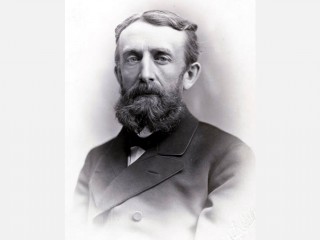
Andrew Dickson White biography
Date of birth : 1832-11-07
Date of death : 1918-11-04
Birthplace : Homer, New York
Nationality : American
Category : Famous Figures
Last modified : 2010-12-03
Credited as : Educator and diplomat, historian, co-founder of Cornell University
Andrew Dickson White, American educator and diplomat, helped found Cornell University and became its first president.
Andrew Dickson White was born in Homer, N.Y., on Nov. 7, 1832. At the age of 17 he entered the Episcopal-oriented Geneva (Hobart) College in western New York, but he disliked it and after a year dropped out and entered Yale. Upon graduating in 1853, he and his friend Daniel Gilman went to Europe. White studied languages and history in Paris and Berlin, and during 1854-1855 he served for 6 months as an attache to the American minister in St. Petersburg, Russia.
In 1856 White received his master of arts degree from Yale and then accepted an offer to be professor of history at the nonsectarian University of Michigan. The young, innovative teacher was an immediate success. During his 6 years there he conceived of a new university for central New York that would be shorn of outworn traditions and would offer the broadest opportunities for study in higher education.
When his father died in 1862, White returned to New York to handle the business affairs of his father's bank. In 1864 he became a state senator, and in the New York Legislature he joined with another senator, Ezra Cornell, on the problem of utilizing the land grant of the Morrill Act (1862), which provided the state with the means of offering education in agriculture and mechanical arts. White fought to concentrate the Federal aid in one institution, and Cornell agreed to give $500, 000 and land for a site to bolster that aim. The result was Cornell University, officially inaugurated in October 1868, with White as its president. He retired from this post in 1885.
During his years at Cornell, where White taught history as well as being chief administrator, he brought to reality his earlier concept of a nonsectarian, coeducational university where not only the classics but also modern subjects including science, agriculture, mechanical arts, and even military science would be taught—a place where every student could study just what interested him or her. White's reforms in teaching and in the curriculum gained him national attention.
White took a leave of absence from Cornell to serve as U.S. minister to Germany (1879-1881). After he retired from the university he served as U.S. minister to Russia (1892-1894) and U.S. ambassador to Germany (1897-1902). He was also minister to the Hague Peace Conference in 1899. He spent his later years in writing and influencing educational projects. He died on Nov. 4, 1918, in Ithaca, N.Y.
The main sources for White's life are Autobiography of Andrew Dickson White (2 vols., 1905), and Walter P. Rogers, Andrew D. White and the Modern University (1942). A good summary of his educational career is in Carl L. Becker, Cornell University: Founders and the Founding (1943).
Altschuler, Glenn C., Andrew D. White, educator, historian, diplomat, Ithaca, N.Y.: Cornell University Press, 1979.
















